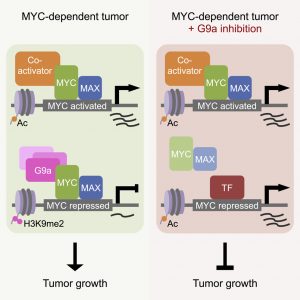Journal:
Cancer Cell. 2018 October; Vol 34 (4): p.579-595.e8
Authors:
William B. Tu, Yu-Jia Shiah, Corey Lourenco, Peter J. Mullen, Dharmendra Dingar, Cornelia Redel, Aaliya Tamachi, Wail Ba-Alawi, Ahmed Aman, Rima Al-awar, David W. Cescon, Benjamin Haibe-Kains, Cheryl H. Arrowsmith, Brian Raught, Paul C. Boutros and Linda Z. Penn.
Abstract:
MYC is an oncogenic driver that regulates transcriptional activation and repression. Surprisingly, mechanisms by which MYC promotes malignant transformation remain unclear. We demonstrate that MYC interacts with the G9a H3K9-methyltransferase complex to control transcriptional repression. Inhibiting G9a hinders MYC chromatin binding at MYC-repressed genes and de-represses gene expression. By identifying the MYC box II region as essential for MYC-G9a interaction, a long-standing missing link between MYC transformation and gene repression is unveiled. Across breast cancer cell lines, the anti-proliferative response to G9a pharmacological inhibition correlates with MYC sensitivity and gene signatures. Consistently, genetically depleting G9a in vivo suppresses MYC-dependent tumor growth. These findings unveil G9a as an epigenetic regulator of MYC transcriptional repression and a therapeutic vulnerability in MYC-driven cancers.
Link: https://www.cell.com/cancer-cell/fulltext/S1535-6108(18)30415-X
DOI: 10.1016/j.ccell.2018.09.001


